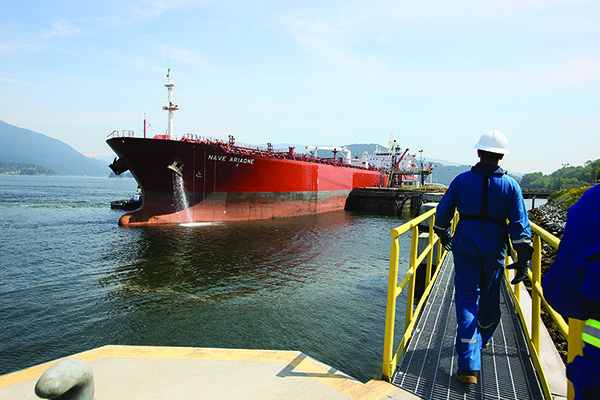Trans Mountain Oil Shippers Raise Concerns About Risk of Delay to Full Service
(Reuters) — Some shippers on Canada's Trans Mountain expansion project are raising concerns that the long-delayed oil pipeline will not be fully in service by its projected start date of May 1, according to a letter to the Canada Energy Regulator on Tuesday.
Deliveries for all shippers will be subject to the expanded system's tolls and tariffs from that date, Trans Mountain Corp told Reuters in an email, adding that line fill on the expanded pipeline will be completed in early May.
But in a letter to the Canada Energy Regulator (CER), shipper Suncor Energy said reasonable questions remain over whether Trans Mountain will be able to deliver contracted crude volumes from May 1 given some sections of the pipeline are still awaiting leave to open from regulators.
As a result shippers are concerned about the obligation to pay tolls from the start of next month, said the letter filed by Suncor's legal counsel on behalf of other shippers including BP and Marathon Petroleum.
"While it is possible that Trans Mountain might be able to complete the physical construction of Expansion facilities by May 1, 2024, there appears to be a real likelihood that those facilities will not be capable of providing Firm Service at that time," said the letter, which appeared on the CER website.
The C$30.9 billion ($22.62 billion) project, bought by the Canadian government in 2018 to ensure it went ahead, will carry an extra 600,000 barrels per day (bpd) of oil from Alberta to Canada's Pacific coast.
It has struggled with years of regulatory delays and cost overruns and Canadian oil producers are keenly anticipating its start-up, which will open up access to export markets on the U.S. West Coast and Asia and should narrow the price discount on Canadian heavy crude versus U.S. benchmark oil.
However, a number of contracted shippers are locked in dispute with Trans Mountain over tolls on the expanded system, citing concerns about significant cost increases.
Trans Mountain is facing a number of complaints from its shippers, who have contracted 80% of the expanded pipeline's volume.
In a separate filing on April 12, Canadian Natural Resources Ltd., supported by Suncor and Imperial Oil, wrote to the CER arguing that the vapor pressure limit on the expanded pipeline is too high and would hurt the sales price of the crude.
In its email on Tuesday, Trans Mountain also said the first ship carrying crude from the pipeline expansion is expected to load in the second half of May.
Westridge Marine Terminal in the Port of Vancouver, where the pipeline terminates, will have three berths able to load vessels with oil, Trans Mountain said. The dock has a maximum capacity of 630,000 bpd, or 34 partially laden Aframax-sized tankers a month.
"On average, we anticipate one empty tanker in, one partially laden tanker out every day with variability throughout the year," a Trans Mountain spokesperson said.
($1 = 1.3660 Canadian dollars)
Related News
Related News

- Keystone Oil Pipeline Resumes Operations After Temporary Shutdown
- Freeport LNG Plant Runs Near Zero Consumption for Fifth Day
- Biden Administration Buys Oil for Emergency Reserve Above Target Price
- Mexico Seizes Air Liquide's Hydrogen Plant at Pemex Refinery
- Kinder Morgan Declares Force Majeure on West Texas Gas Pipeline After Fire
- Venezuela Proposes Alternative Payment Plan as Weak Bids Surface in Citgo Auction
- Baker Hughes Wins Contract for Huge Aramco Gas Expansion Project
- Enbridge Picks Contractors for Great Lakes Tunnel Project, Securing Line 5 Pipeline Route
- Russia's Gazprom Sees Worst Loss in Decades as European Gas Sales Collapse
- Shell Nigeria Inks $100 Million Gas Pipeline Deal with Oyo State





Comments